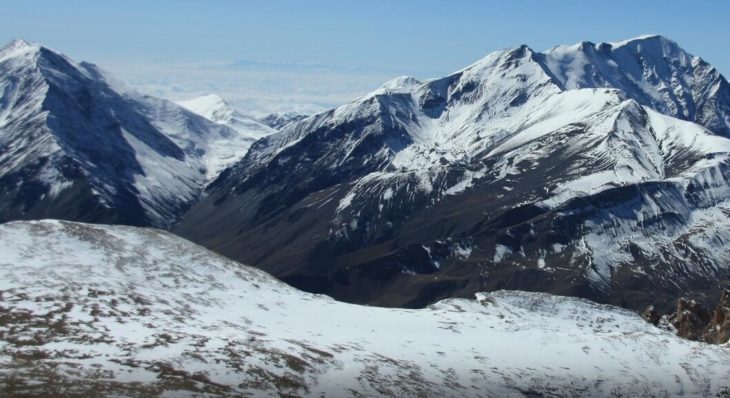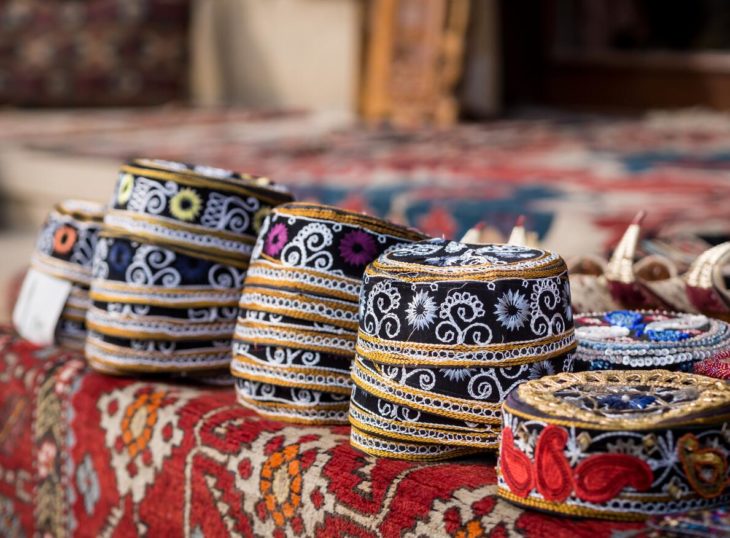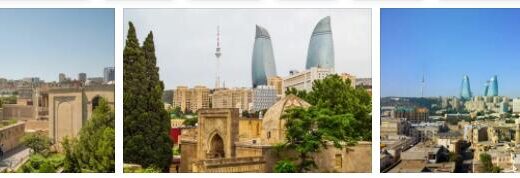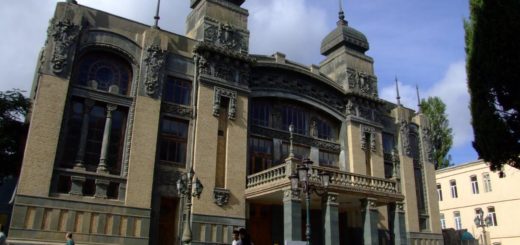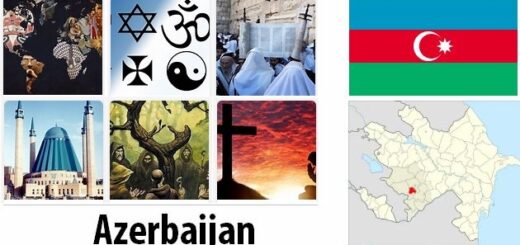Azerbaijan
Azerbaijan, a Republic in Asia, the easternmost of the states of the Caucasus. Azerbaijan is located on the west bank of the Caspian Sea and borders Russia in the north, Iran in the south, Armenia in the west and Georgia in the northwest.
Azerbaijan also includes the excavator Nakhichevan, which lies between Armenia and Iran. Nakhitsevan also has a short border with Turkey in the west.
The area of Nagorno-Karabakh, which is near the border with Armenia, is officially part of Azerbaijan, but the territory has declared itself an independent state and is not under the control of the Azerbaijani authorities. Armenia controls the area around Nagorno-Karabakh.
Azerbaijan had a brief stint as an independent state in the years 1918-1920, and was then incorporated into the Soviet Union. When the Soviet Union disintegrated in 1991, Azerbaijan again became an independent state.
The largest group of people is Asians, a Turkish people. Oil is the most important export commodity and driving force in the economy. Oil and gas production has led to tremendous economic growth since the 1990s.
The name originally means “Kingdom of the World”. National Day is May 28, after the formation of the first Azerbaijani Republic on this day in 1918.
The national anthem is Azərbaycan Marşı (Azerbaijan’s March). The music is written by Uzejir Hajobejov and the lyrics by Ahmad Javad. It became a national anthem when Azerbaijan was independent in 1920, and resumed in 1992, following the collapse of the Soviet Union.
Geography and environment
Azerbaijan is located in the South Caucasus. The Caucasus forms the border between Europe and Asia. Therefore, it is a defining question whether Azerbaijan is located in Europe or Asia.
In the east the land is bounded by the Caspian Sea. With the exception of this coastline, Azerbaijan is surrounded by mountains. To the north lies the Great Caucasus mountain range, and to the west, to the border with Armenia, lies the Little Caucasus.
The highest point is the mountain peak Bazarduzu Dagi, which extends 4485 meters above sea level. The lowest point is the coast of the Caspian Sea. This lake is 28 meters below sea level.
The climate is subtropical. In the south, there is much rainfall, while the rest of the country is drier. The average temperature in the capital Baku is 4 ° C in January and 25 ° C in July.
There are 107 different mammal species, 363 bird species and fishes in Azerbaijan. The rare jejrangas cell is found only in the Sjirvan National Park. Azerbaijan has more than 4,500 plants, giving the country the richest flora of the countries of the South Caucasus.
The Caspian Sea is heavily polluted by emissions and leaks from the oil industry. Baku, which is the center of Azerbaijan’s oil industry, is one of the world’s most polluted cities. Excessive use of pesticides and artificial fertilizers in the Soviet era has destroyed much of the arable land and contaminated drinking water.
People and society
92 percent of the population are Asians. The largest minorities are Lezginians (2 per cent), Russians (1.3 per cent), Armenians (1.3 per cent) and Talys (1.3 per cent).
Azerbaijan is the official language, and is spoken by 92.5 percent of the population. Other languages are Russian (1.4 per cent have Russian as their mother tongue, but the language is spoken by far more) and Armenian (1.4 per cent).
Azerbaijan has no official religion, but 97 percent of the population are Muslims (with a high predominance of Shi’ites). Around three percent are Christians.
Life expectancy is 75.5 years for women and 69.2 years for men. 55 percent of the population lives in cities. The largest city is the capital Baku, which has 2.4 million inhabitants.
State and politics
Azerbaijan is a republic. The president is the head of state, while the prime minister is the head of government. The president and the government both have executive power. The legislative power lies with the president and the National Assembly.
The President is elected for a term of five years. At the 2013 presidential election, Ilham Alijev got 84.5 percent of the vote.
The National Assembly has one chamber, consisting of 125 representatives. All representatives are elected from individual circles. The representatives sit for periods of five years.
The Supreme Court is the Supreme Court. There is also a Constitutional Court, which has the authority to decide interpretations of the Constitution. The judiciary is nominally independent, but the authorities are criticized for using the courts to prosecute dissidents.
Although Azerbaijan is a democracy under the Constitution, the sitting regime shows many authoritarian features. Ilham Alijev has served as president since 2003. Ilham Alijev succeeded his father Hejdar Alijev, who died in 2003, after ten years as president.
Azerbaijan is a member of the UN and most of the UN’s special organizations, the World Bank, the Council of Europe, the OSCE and ECO (the economic cooperation organization for Muslim countries in the region). The country participated in the establishment of the Commonwealth of Independent States in 1991, but first joined the organization in 1993. Azerbaijan entered into 1994 Partnership for Peace Agreement with NATO.
History
The oldest signs of hominids in Eurasia are found in the Azykh Cave in Azerbaijan. Tools found in the cave are believed to be at least 700,000 years old.
A number of civilizations and peoples have affected the area that is today’s Azerbaijan. The geographical position between Europe, Asia and the Middle East has led to the area being subject to a number of different kingdoms and populated by different peoples. Therefore, name, language and religion have changed several times throughout history.
In the 900s BCE. Caucasian Albanians (not related to today’s Albania ) came to the area. The area became part of Persia around 600 BCE, and Zoroastrianism became the dominant religion.
Alexander the Great conquered the area in 330. 190 to 428, parts of the area were subject to an Armenian kingdom. In the 100th century BCE. arose an Albanian kingdom, which became a Christian in the 300s AD.
The Arabs abandoned the area in the 600s and brought Islam with them. In the 13th century came the Mongols. Then Azerbaijan became part of the Persian Empire.
Towards the end of the 18th century, Russia began to expand southward in the Caucasus. In 1799, the Russians captured Tbilisi in Georgia. The Sea of Persia went to war against Russia to regain Georgia, but ended up losing Dagestan and Azerbaijan to the tsar. An agreement of 1828 led the Azerbaijani people to be divided between Persia and Russia.
In 1846, oil was found outside Baku. At the beginning of the 20th century, half of the world’s oil was produced in Azerbaijan. Mainly, European investors were rich in oil, while local workers lived in poverty. The conditions of the oil workers and the huge class differences in Azerbaijan led to political and ethnic contradictions, and contributed to the breeding ground of the Russian revolution in 1917.
After the revolution, the Democratic Republic of Azerbaijan was established in 1918. This state formation was short-lived. The Red Army invaded in 1920, creating the Soviet Socialist Republic of Azerbaijan. During Josef Stalin’s reign of terror in the Soviet Union, more than 100,000 Azerbaijanis were killed or sent to labor camps.
In the 1980s, ethnic rubbish between Armenians and Asians ignited. The core of the conflict was the Nagorno-Karabakh area, which was an autonomous district of Azerbaijan. The majority of the people of Nagorno-Karabakh are Armenians, and many wanted the district to become part of the Soviet Republic of Armenia.
Azerbaijan declared independence in August 1991, and after the dissolution of the Soviet Union, the republic was recognized as an independent state. The conflict with Armenia was not resolved, and in 1992 armed conflict broke out over Nagorno-Karabakh. A ceasefire was entered into in 1994, but the conflict remains unsolved. Armenia has de facto control over Nagorno-Karabakh and Azerbaijan territory all around, while virtually the entire Azerbaijani population has fled to other parts of Azerbaijan.
Hejdar Alijev, who had been leader of the Supreme Soviet in Azerbaijan until he was deposed in 1987, was elected president in 1993. His son Ilham Alijev was elected president just before his father died in 2003.
Economy and business
One of the routes on the Silk Road went through Azerbaijan, and historically trade has played an important role in the economy. Azerbaijan has experienced rapid economic growth since its independence. In 2006, growth was 34.5 percent, the highest in the world at that time. Growth dropped to almost zero in 2011, but has then picked up again.
Azerbaijan is a major producer of oil and gas, and the development of the offshore sector in the Caspian Sea has been the economic driver since the beginning of the 2000s. When the Baku-Tbilisi-Ceyhan pipeline, which transports oil from Baku to Ceyhan in Turkey, was completed in 2005, Azerbaijan was able to export oil without using Russia as a transit country.
In addition to hydrocarbon production, Azerbaijan has a cotton, fruit and vegetable farming industry. 55 percent of Azerbaijan is arable land. The country also has some minerals extraction, including aluminum, lead, iron and zinc.
Gross domestic product (GDP) is $ 75.2 billion (2014).
As in many other former Soviet republics, the country has a poorly developed market economy. Corruption is widespread. The country is ranked 119 out of 168 countries on the Transparancy International’s Corruption Perception Index.
There has also been evidence suggesting that President Ilham Alijev’s family has hidden interests in Azerbaijan’s business. Among other things, companies have been set up in tax havens, owned by the president’s wife Mehridan Alijeva and the couple’s two daughters.
Knowledge and culture
Children start school when they are six years old. The first nine years of schooling are compulsory. Then, students can choose to continue with a two-year high school.
Television is the most important medium. There are three state TV channels, as well as many private ones. Many of the newspapers are also controlled by the state or the president, either through direct state ownership, or through hidden ownership structures. Two of the most popular newspapers are the regime-critical Yeni Musavat and Azadlıq.
Under the Constitution, Azerbaijan has freedom of speech and freedom of the press, but in practice the media is subject to strict censorship. Critical journalists risk harassment and persecution.
The authorities do not normally block websites, but activists and critical voices experience the same kind of persecution as journalists. According to Internetlivestats.com, Azerbaijan has six million internet users (2016), which corresponds to 60 percent of the population.
Azerbaijan has a long literary tradition. Dede Korkut is a central epic work for Turkish peoples, including Azerbaijanis. The work is a collection of legends and stories. The stories were written after the Turks converted to Islam, but were told for many generations before that.
The most important poets of modern times are the playwright Mirza Ahundzade (1812-78) and in the Soviet Republic of Azerbaijan novelist Dsjafar Dsjabbarli (1899-1934) and poet Samed Vurgun (1906-56). After Azerbaijan became independent, the country switched from using Cyrillic alphabet to an extended Latin alphabet.
Azerbaijani folk music is usually a combination of song and instrument, where the vocalist tells a story. Common instruments are string instruments such as take and oud, woodwind instrument balaban and various rhythm instruments.
Azerbaijani popular music is inspired by both western and local styles. Chingiz Mustafaiev wrote “Yesterday is History”, Azerbaijan’s first rap song, in 1983, which made him a hip-hop pioneer in the Soviet Union.
Azerbaijan’s film history dates back to 1898, when Frenchman Alxandre Michon began filming daily life in Baku. In 1995, Azerbaijan director Rustam Ibragimbekov received an Oscar for the film “Burned by the Sun” (best foreign film).
